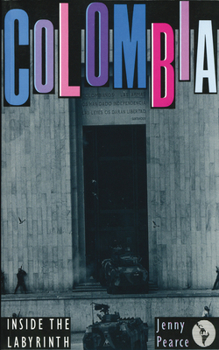Colombia: Inside the Labyrinth
Select Format
Select Condition 
Book Overview
Colombia: Inside the Labyrinth explains the reality behind the official and the actual country. It examines the historical basis of Colombia's two-party system and analyses the corruption and instability which have undermined the state's ability to govern.
Format:Paperback
Language:English
ISBN:0906156440
ISBN13:9780906156445
Release Date:January 1990
Publisher:Latin America Bureau (Lab)
Length:328 Pages
Weight:1.20 lbs.
Dimensions:0.7" x 5.0" x 8.0"
Age Range:8 to 12 years
Grade Range:Grades 3 to 7
Customer Reviews
1 rating
Review by the Independent
Published by Thriftbooks.com User , 18 years ago
The Independent (London) March 19, 1990, Monday Barons of The Violence; 'Colombia: Inside the Labyrinth' - Jenny Pearce: Latin America Bureau, 8.99 pounds By COLIN HARDING COLOMBIA is a notoriously difficult country to write about - or, to put it another way, a notoriously easy one to caricature. If it has any image at all in Europe it is as an archetypal Latin American republic: violent, unstable, dominated by drug traffickers and gunmen of one sort or another. That is part of the truth, the part seized on by the television crews and assorted firemen parachuted in after the Colombian government declared war on the cocaine cartels last August. But there is, inevitably, more to it than that. There have, for one thing, been very few military coups in a 170-year republican history that began with a ferocious war of independence against Spain. Political life has for the most part been run by two traditional parties, the Liberals and the Conservatives, and power has changed hands through the ballot box more often than not. But this apparently mature, not to say cosy, arrangement has been punctuated by a succession of civil wars, the latest and most bloodthirsty of which, known simply as The Violence, cost up to 300,000 lives between 1948 and the early 1960s. So perverse, so inexplicable by normal human standards was this period of communal bloodletting that historians and social psychologists have been driven to devising theories of collective psychosis, of ''thanatomania'', a morbid obsession with death. Since the generalised political violence began to abate in the late 1950s the traditional two- party arrangement has reasserted itself, and still dominates Colombian political life. But many of the armed groups that sprang up during the civil war, mainly for self-defence, subsequently declined to lay down their weapons, and tens of thousands of armed men and women remain in the field to this day, in defiance of a political system they regard as illegitimate. The current President, Virgilio Barco, a Liberal, is attempting to restructure Colombia's political life and institutions to induce the guerrillas to come in from the cold. He may even succeed. Where do the cocaine mafias fit into this mixture of venerable institutions and random slaughter? Contrary to appearances, the Colombian economy is neither backward nor dominated by a single crop, and the business groups that control it are not easily penetrated or taken over by racketeers. In addition to coffee, which accounts for about 30 per cent of exports, there are well-developed textile, leather, chemical, cut-flower and printing industries, and Colombia adapted to an ''export culture'' long before most other Latin American countries. Public finances are notably well run, and Colombia is almost alone in the region in not having an unmanageable foreign debt. The industrial and financial heart of the country is Medellin, a bustling highland city now known to the outside world almost exclusive





